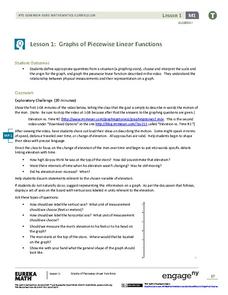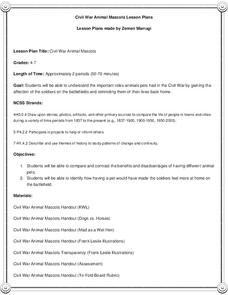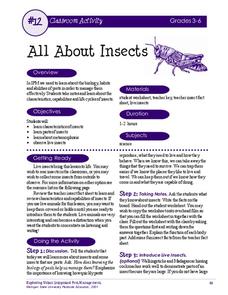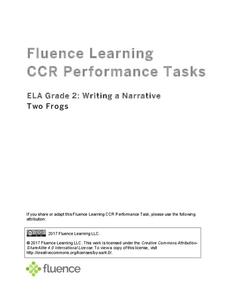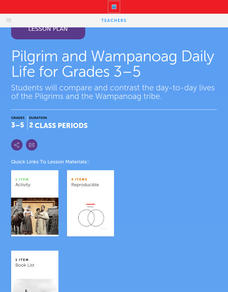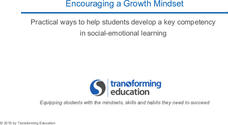Sean Banville
New Year's Day
Focus on a passage about the new year with your English language learners. You can start with reading the passage aloud to your class, and then launch into the related activities. Pupils match phrases, complete cloze-style activities,...
EngageNY
Graphs of Piecewise Linear Functions
Everybody loves video day! Grab your class's attention with this well-designed and engaging resource about graphing. The video introduces a scenario that will be graphed with a piecewise function, then makes a connection to domain...
Civil War Trust
Civil War Animal Mascots
A pet can offer comfort, friendship, and loyalty in the most stressful of situations. Here is a lesson plan that explores the important role animals played during the Civil War. Class members read informative texts, complete a KWL chart,...
Houghton Mifflin Harcourt
Smart Solutions: English Language Development Lessons (Theme 6)
Smart Solutions is the theme of a unit created to meet the needs of English language earners. Through a series of lessons, scholars follow a routine—move, speak, and listen— to cover topics including stores, shops, celebrations, pets,...
Center for Learning in Action
Introduction to the States of Matter
Liquids, gases, and solids are the states of matter in which scholars investigate in a lesson plan that offers in-depth information and engaging activities that look into the three states and the changes their properties make when mixed...
Center for Learning in Action
Gases
Explore the properties of gases through one activity and two investigations in which super scientists observe the changes gas makes when encountering different conditions.
Close Up Foundation
Teach the Vote
Why is voting important? A social studies unit presents a non-partisan approach to the importance of voting, to voting laws and procedures, and to resources that voters need to become informed voters.
Michigan State University
All About Insects
Insects are the focus of an activity that looks deep into the anatomy and metamorphosis of everyday bugs. Two worksheets reinforce knowledge obtained through a teacher-guided grand conversation and insect observation.
Michigan City Area Schools
Goal Setting for Students
Inspire scholars to shoot for the moon with a presentation that details why goals are important, how to define and identify a goal with four essential questions, the difference between dreams and goals, and tips to achieving a goal.
New Jersey Historical Commission and New Jersey Council for the Humanities
Thomas Edison: The Wizard of Menlo Park
What would change in your daily life due to a power outage? Here, learners explore the inventions brought to us by the one and only, Thomas Edison, and imagine a day without them. Scholars take part in a grand conversation and write a...
Science Matters
Crawly Composters
Get your hands dirty with an interactive lesson that showcases the process of decomposing and returning nutrients back into the soil. After building a compost pile, pupils regularly observe the ways worms help with changes to the soil...
Fluence Learning
Writing a Narrative: Two Frogs
Three options offer young writers the opportunity to read a short story, answer questions, and write a response. A handy language arts resource focuses on reading comprehension and analyziing the story's lesson: look before you leap.
Amnesty International
Respect My Rights, Respect My Dignity: Module One – Poverty and Human Rights
Creating an environment where learners feel both educated and empowered challenges any teacher when discussing a sometimes bleak topic. A respectful resource provides them with the details and permits them to make a plan of action....
Saddleback College
The Wonder of Words
If your language arts students think etymology isn't relevant to their everyday lives, show them a presentation that will prove them wrong! The slideshow provides explanation about various words, roots, and suffixes that have adapted in...
Poetry4kids
How to Create Book Spine Poetry
Can you create a poem without writing a word! With found poetry, you can! Practice one version of found poetry with a lesson on book spine poems. Learners create poems by stacking books and reading the lines created by their spine titles.
American Museum of Natural History
Make Your Own Paper
Paper, paper everywhere. Paper is so prolific that few think about where the idea for it originated and how it is made. Introduce young readers to the paper-making process with an activity that lets them create their own.
American Museum of Natural History
Inca Investigation
A fascinating interactive resource lets young archaeologists dig through the history of Huanuco Pampa. The Inca city, located high in the Andes mountains of Peru, was once a thriving community. Craig Morris has spent years researching...
American Museum of Natural History
Dress Up a Horse
Walk, trot, gallop! Young equestrians have an opportunity to learn all about horses with an engaging resource that lets them select tack to dress up a horse, create flip books that illustrate the various gates, have questions answered by...
Scholastic
Pilgrim and Wampanoag Daily Life for Grades 3-5
Thirteen steps make up a lesson that challenges pupils to compare and contrast the daily lives of Pilgrims and the Wampanoag tribe. Learners revisit the Graffiti Wall then break into small groups for an investigative reading assignment...
Transforming Education
Growth Mindset Toolkit
A nine-slide presentation provides educators with practical ways they can help young people develop a growth mindset, a key competency in social-emotional learning.
American Museum of Natural History
Horse Gaits Flipbooks Walk, Trot, and Gallop!
Scholars follow seven steps to create horse-themed flipbooks. Three printable options allow them to choose from walking, trotting, or galloping scene.
American Museum of Natural History
Make Your Own Weather Station
Scholars build a weather station equipped with a wind vane, rain gauge, and barometer. Following an informative page about the weather, learners follow steps to build their pieces then turn into meteorologists to chart the weather they...
Curated OER
Bang for Your Buck
Students explore reasons for making a particular purchase and examine one strategy Wal-Mart stores used to keep prices low. They research and compare two companies that make similar products using different business philosophies.
Curated OER
Another Trip to the Nurse's Office
Students consider the role of the nurse at their school. Using Internet resources and archived articles, they gather information regarding relevant health topics. Students use their information to create pamphlets on health topics...



